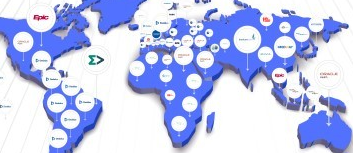Black Book Unveils Q2 2025 Global EHR Market Update: 14 Regional and Multi-National Vendors Take the Lead in Transforming Worldwide Healthcare IT
Black Book's quarterly global survey of over 11,000 healthcare leaders across 44 countries highlights the rise of regional EHR firms-such as Dedalus, MV Sistemas, InterSystems, Philips Tasy, and Comarch-as they surpass U.S. vendors in localization, adaptability, and satisfaction.
LONDON, GB / ACCESS Newswire / May 10, 2025 / Black Book™ Market Research has released a Q2 comprehensive update to Global EHR Market Report revealing a growing shift in international healthcare IT dynamics. Drawing on the voices of over 11,000 clinicians, IT leaders, and healthcare operations executives across 44 countries, the Q2 2025 findings underscore the surge of regional and multi-national EHR vendors that are now outpacing U.S.-based giants in client satisfaction, speed of implementation, and local market integration.
Once dominant on the global stage, the most recognized U.S.-based EHR firms: Epic Systems, Oracle Health (formerly Cerner), MEDITECH, and Altera Digital Health (formerly Allscripts) are increasingly challenged by this new generation of regional and multi-country vendors. Political dynamics, rising nationalism, and mounting international resistance to American healthcare software dominance, fueled in part by trade tensions and digital sovereignty policies, are accelerating this competitive realignment according to respondents.
"Global EHR growth is no longer about who has the biggest footprint, it's about who delivers measurable value in-country," said Doug Brown, President of Black Book. "Vendors like Dedalus in Europe, MV Sistemas and Philips Tasy in Latin America, and Comarch and Asseco in Central Europe are building EHR ecosystems that reflect local realities, not just exporting U.S. workflows into vastly different clinical environments."
Top-Performing Global and Regional EHR Vendors (2025 Highlights)
Dedalus (HQ: Florence, Italy):
Operates in over 40 countries
Supports 470,000+ hospital beds globally
Leads market share in France, Germany, and Italy
Expanding rapidly in Sweden, Latin America, UK, Ireland and India
Top-rated for localization, clinical usability, and privacy compliance
MV Sistemas (HQ: Recife, Brazil):
Most widely adopted acute-care EHR vendor in Latin America
Active in Chile, Colombia, Mexico, and Angola
92% user satisfaction for mobile access, cost-effectiveness, and language support
SOUL MV platform ranks #1 in Latin America for scalability
InterSystems TrakCare (HQ: Cambridge, Massachusetts, USA):
Deployed in 29 countries
High ratings for interoperability and modular adaptability
Success in Australia, Middle East, and Brazil
Strong multilingual functionality and clinician-friendly configuration
Philips Tasy (HQ: Amsterdam, Netherlands):
Over 1,000 installations in Brazil and Mexico
Expanded into Germany, UAE, and Australia
Highest-rated for native cloud integration in public hospital networks
Comarch Healthcare (HQ: Kraków, Poland):
Growing presence in France, Germany, Switzerland, Austria, and Italy
Offers multilingual support, intelligent documentation search, and EHR inter-facility exchange
Recognized for cost-effective, fast deployment across diverse clinical settings
Asseco Central Europe (HQ: Bratislava, Slovakia):
Key provider in Poland, Czech Republic, Hungary, and the Baltics
Developed Slovakia's National Health Portal and ePrescription platform
Excels in public health digitization and national-scale deployments
Meierhofer (HQ: Munich, Germany):
Core markets: Germany, Austria, Switzerland
Expanding into the Netherlands
Specialized EHR modules for ICU, surgery, and EDs
Rated highly for clinical workflow integration and user interface
NTT DATA (Everis) (HQ: Tokyo, Japan / Regional HQ: Madrid, Spain):
Dominates Spanish-speaking markets: Mexico, Brazil, Argentina, Spain
ehCOS Suite widely implemented across national health systems
Combines regional expertise with NTT's global innovation resources
Systematic (HQ: Aarhus, Denmark):
Columna CIS is Denmark's most-used EHR platform
Deployed across Sweden, Norway, and Finland
Rated highest by clients for clinician co-designed user experience
Specialized and Emerging Multi-Region Vendors
Health Insights (HQ: Cairo, Egypt):
MEDiC® platform tailored for rural, resource-limited settings
Deployed in Egypt, Saudi Arabia, and Sub-Saharan Africa
Supports integrated care across public, private, and NGO-run health systems
Helmes (HQ: Tallinn, Estonia):
Built Estonia's national e-Prescription and EHR systems
Deployed in Latvia, active in Norway, Sweden, and Japan
Trusted for digital public health and registry-level interoperability
MedRegis (HQ: Bridgetown, Barbados):
Cloud-based EHR system scaling across the Caribbean
Active in Trinidad & Tobago, Jamaica, Guyana, and Barbados
High satisfaction for mobile-first design, billing automation, and telehealth integration
Open Hospital (HQ: Trento, Italy / Program Origin: Uganda):
Open-source EHR used in 23 hospitals across 13 countries
Deployed in Uganda, India, Afghanistan, Nepal, and Greece
Designed for offline use, multilingual environments, and low-cost implementations
Orion Health (HQ: Auckland, New Zealand):
Maintains large-scale HIE infrastructure in New Zealand, Canada, and Saudi Arabia
Focused on population health, data exchange, and community-level care records
U.S. Vendors Still Active, But Facing Global Headwinds
While the big four US-based HIT vendors continue to secure new global contracts, they are encountering increasing resistance. International healthcare leaders cite rising anti-American sentiment, retaliatory tariff policies, and digital protectionism as major deterrents to selecting U.S.-based systems in 2025 and beyond, say responding global provider organizations.
In 28 of the 44 countries surveyed, 71% of provider organizations using U.S.-based EHRs reported friction points related to mismatches in workflow, local coding standards, language modules, or regional privacy compliance. European and Middle Eastern respondents specifically cited cost structure and vendor transparency concerns, as well as growing political pressure to select regionally headquartered alternatives.
"It's not that the U.S. vendors don't have the technology because they do," Brown noted. "But global success now requires deep partnership, not just product. Regional firms are doing that far better in 2025."
"For stakeholders seeking to expand globally or modernize national health systems, the report makes one thing clear," said Brown. "Success belongs to those who listen locally and build systems that respect the realities of the markets they serve."
As the global EHR market continues to grow, the Q2 2025 Black Book gloabl updated findings show that trust, speed, localization, and vendor-client collaboration will determine the next generation of market leaders. Multi-country vendors with regional fluency are no longer the exception, they are on the cusp of becoming the new global standard.
About the Report
The baseline study, The Black Book™ 2025 Global EHR Market Report is based on over thirty thousand verified responses from clinicians, IT leaders, and administrators in 110 countries. The study evaluates Health IT vendors across 18 KPIs and includes country-specific insights, market growth trends, policy landscapes, and vendor performance benchmarks.
Download the full 600 page report at no cost to industry stakeholders:https://blackbookmarketresearch.com/register-for-the-black-book-of-global-healthcare-it-2025-report
Contact Information
Press Office
[email protected]
8008637590
SOURCE: Black Book Research
Information contained on this page is provided by an independent third-party content provider. XPRMedia and this Site make no warranties or representations in connection therewith. If you are affiliated with this page and would like it removed please contact [email protected]

